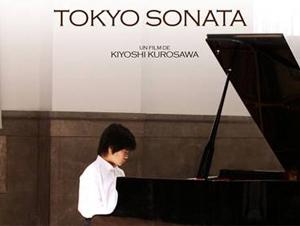Japanese film reflects economic crisis
In this tanking economy, millions of people have already lost their jobs. That’s where the Japanese film “Tokyo Sonata” begins. Kiyoshi Kurosawa is the director of “Tokyo Sonata.” No relation, by the way, to the late Akira Kurosawa. AnchorMarco Werman from "The World" has the interview:
Marco Werman: So what I’d like to know, Mr. Kurosawa, is how big is this phenomenon in Japan right now? Are salaried men losing their jobs and hiding the shame of it from their families?
Kiyoshi Kurosawa: I think the duration with which they keep it a secret might be case by case. It might vary quite a bit. But the strange psychology of keeping something like unemployment a secret is something that is very common, especially among businessmen today.
Werman: You actually see people gathering on the street like that?
Kurosawa: Yes. We actually filmed it a little over a year ago. And even then, we saw little pockets of that in various places in Tokyo. But I think with the economy where it is today, I’m told that there are many more people on the streets like that.
Werman: If this phenomenon of hiding you know one’s shame about being unemployed in Japan is so common, I’m wondering if it’s a stigma that will fade as the economic crisis kind of emerges from its doldrums and people sort of slowly get back to work? Or is always going to be there? Is it deeply ingrained in Japanese culture?
Kurosawa: I think in Japan, this phenomenon of fathers leaving for work and then having the family have absolutely no clue what they do when they go out the door each day – I think that’s been the way in Japan for many years now, and I imagine it will stay that way. What it does is create the illusion of authority for the father. The fact that he’s somehow being useful to society and earning money, and this secret they’ve been able to keep has been creating this illusion for a long time. I think it may stay that way for a long time.
What happened when the secret is exposed in the film isn’t so much that he lost his authority but they all essentially decided to stop pretending, to stop the lies, and I think it’s more a sense of relief together with maybe a little bit of shock at that moment.
Werman: While the father in “Tokyo Sonata” is grappling with his own shame, there are numerous sub-plots at work. There’s the older son who enrolls as a volunteer in the American army and goes to Iraq and has his own kind of, like, identity crisis while there. The young son that isn’t allowed to take piano then proves his talent for it. And the mother is kidnapped in this weird scenario and finds a kind of redemption thanks to her captor. It kind of feels like, you know, they all at the end, find their inner peace.
And I’d like to know what your final message is here – that in a wage economy where everything is so rigid in Japan, that we really need to identify what’s important in life?
Kurosawa: That’s correct. The family essentially unravels and crumbles, and in the end they have a chance to get together again with of course the exception of the oldest son. But I think what they‘re doing is starting from scratch. They’re not going to go back to old ways. What they have to do is from here find a new way of relating to each other as a family also, but more importantly as individuals, to find out how they can overcome their internal issues.
And in that moment, hopefully we’re able to see some type of redemptive quality there. And I think if the younger generation, especially children, are able to find some hope in the new bright future that I’m able to sort of lay out, then I’ll be happy with what I’ve been able to accomplish.
PRI’s "The World" is a one-hour, weekday radio news magazine offering a mix of news, features, interviews, and music from around the globe. "The World" is a co-production of the BBC World Service, PRI and WGBH Boston.
Every day, reporters and producers at The World are hard at work bringing you human-centered news from across the globe. But we can’t do it without you. We need your support to ensure we can continue this work for another year.
Make a gift today, and you’ll help us unlock a matching gift of $67,000!
